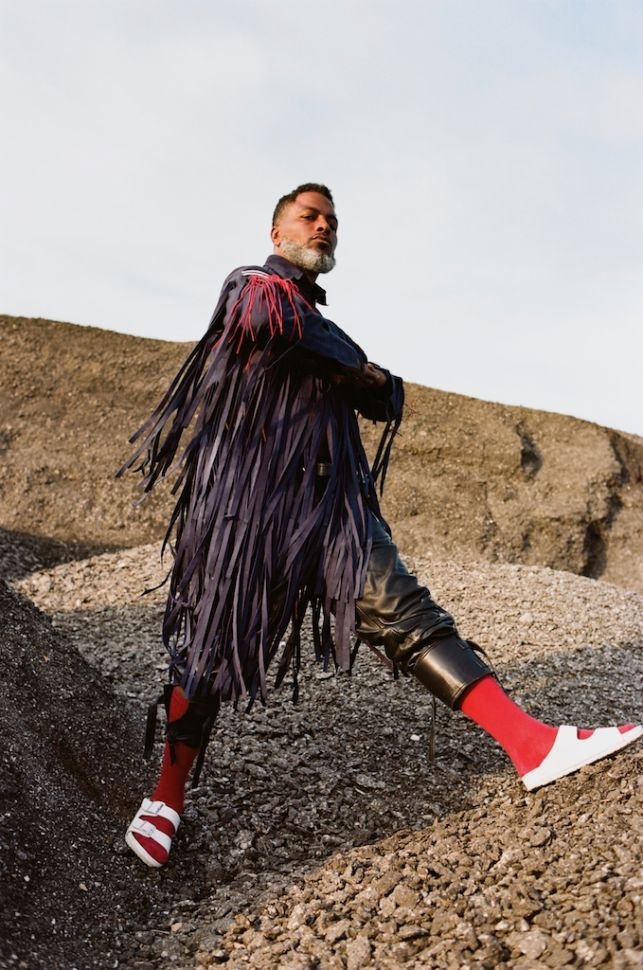
If you adhere to the corporeal limitations of space and chronology, it’s been roughly a decade since Shabazz Palaces first shook the ramparts with their debut stylistic revolution, Black Up — which Pitchfork named as one of the Best of the 2010s, hailing it as an “album of impossible vision.” But the project masterminded by vocalist and producer Ishmael Butler (with levitational assists from multi-instrumentalist Tendai “Baba” Maraire) has never conformed to gravitational consideration or terrestrial measurement. They are heirs to the astral imagination of Sun Ra and George Clinton, Octavia Butler and Alice Coltrane. If they technically claim residence in Seattle, their sound emanates much closer to Alpha Centauri than Alki Beach.
In his unstinting drive to reimagine hip-hop, Butler remains one of the preeminent visionaries of the last quarter-century. His first album with Digable Planets, Reachin (A New Refutation of Time and Space, nodded at Miles Davis in the first half of its title, but 27 years later, he has become one of the most vaunted inheritors of the trumpet deity’s rarefied legacy — still innovating as he enters his fourth decade as a working musician — splintering, rebuilding, and expanding the possibilities of sound. He has collaborated with like-minded visionaries Flying Lotus and Thundercat, Battles and Animal Collective. While all-timers like Radiohead and Lauryn Hill have invited him to join them on tour.
It remains impossible to accurately describe a Shabazz Palaces album without lapsing into cosmic tropes. Yet sometimes clichés are stand-ins for eternal truths. Therein, The Don of Diamond Dreams embodies a futuristic manifestation of ancient myth, full of robotic vocoder and warped auto-tune, Funkadelic refracted into different dimensions, weird portals and warm nocturnal joy rides alongside the coast (a reflection of it being mixed near the beach in California). The synthesizers are alien but the drums speak a universal language. It is hip-hop, dub, jazz, R&B, soul, funk, African, experimental, and occasionally even pop. But over the course of five albums, Shabazz Palaces have conceived the fluid boundaries of their own one-band genre.
Even though the construction of the album is meticulous, it’s a startling masterpiece of improvisation and instinct. It’s both cerebral and automatic, with Butler jotting down phrases and ideas in his phone and eventually shaping them into amorphous abstract expressionist canvasses. If anything, their latest illustrates Butler’s gift for being a conduit of sounds and experience. It’s partially shaped by his own reflection on being a parent and watching his son, Jazz, become internationally renowned as the artist, Lil Tracy. If you listen closely, you can hear the interplay between father and son, as Butler does what is impossible for most veteran artists: he absorbs the sounds of today’s youth, but filters it through his own fractured lens, spitting back convex poems with wild cadences, freestyling with the wisdom of age and the frenetic passion of someone still trying to show and prove. It’s confident and suffused with the thing that defines almost all great art: the willingness to risk attempting something new.


There is “Ad Ventures,” a shout out to Butler’s crew, The Black Constellation. The beat operates like a melodic free jazz hymn, with Ish boasting about Ethiopian carats and watching lakes from a theological terrace. It’s an imagistic rendering of their tours through Europe in sprinter vans, blitzing from place to place and absorbing every detail. Featuring Purple Tape Nate, “Fast Learner” offers odd splendor, spoken word reveries and flexes that wriggle through a wrinkle in time. The synthesizers sound like New Age from the 37th century crossed with 90s R&B, the drums are slow and seething. On top of that, Butler laid a guitar line down and auto-tune harmonies that instantiate the feeling of driving along PCH at night.
“Wet” is a freestyle of sorts with Ish offering his own twist on contemporary rap cadences but making it sound like an underwater Atlantis symphony. There are Based God shoutouts and fuzzy guitars that wouldn’t sound out of place on an Ariel Pink album. “Chocolate Souffle” is some god-level shit-talking in the way that only Butler could do: replete with Maurice Chevalier allusions and admissions of being an “elitist at the zenith of slick demeanor.” While “Thanking the Girls” might be the most poignant song in the Shabazz catalog, a song that acknowledges the myriad positive ways in which women have shaped Butler’s life. The second verse is dedicated to his two daughters and the pride which they engender. Of course, this is a Shabazz Palaces song so the beat sounds like a riff on Panda Bear distilled through a bent futuristic boom-bap prism.
In some respects, it’s difficult to consider the possibility that this might be the best Shabazz Palaces album yet. Very few musicians have ever peaked in their fifth decade on earth, but whoever said they were actually from earth? It’s wrong to say that Shabazz Palaces have gone beyond the looking glass. This time they’ve shattered it entirely and created a brilliant new universe in each one of the shards.






